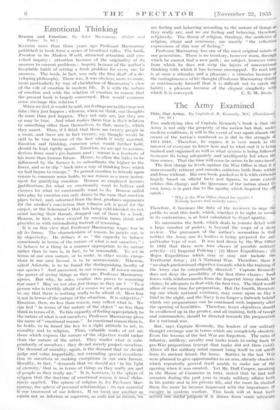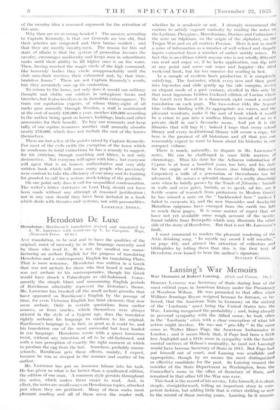The Army Examined
This, Our Army. By CaptainAT. R. Kennedy, M.C. (Htitchinsoili 10s. 6d.) Tim underlying idea of Captain Kennedy's book is that the, Army is not only the property of the nation but that, undet modern conditions, it will in the event of war again absorb the cream of the nation's manhood as it did In the struggle of 1914-1918. Therefore, he argues, it is very much in the interest of everyone to know how and to what end it is being trained and organised as well as What system is being followed to ensure its being adequately and intelligently led when the time comes. That the time will come he Semis to be convinced., The firStcharge. he levels ,against the War.Ofilee' is that it is unnecessarily reticent and muzzles criticism both from within and from without. His own book, pricked as it is with criticism largely based on official facts and figures, to some exte0 refutes this charge, and the ignorance of the nation about if,Si own Army is in part due to the apathy which inspired the A catch : " Why is the War Office closed for mpaik ? Nobody knows and nobody earos.", • Therefore, it becomes the duty of the reviewer to urge the public to read this book, which, whether it be right or wron'g, in its contentions, is at least calculated to dispel apathy.
To summarise the book, which deals in minute detail with a large number of points, is beyond the scope of a sho4 review. The gravamen of the author's accusation is thay neither the Army nor its leaders is being prepared for any particular type of war. It was *lid down by the War Office in 1982 that there were four classes of possible military activity—(1) Imperial Policing ; (2), Minor Expeditions ; (19 Major Expeditions which may or may not include the Territorial Army ; (4) A National War. Therefore, there is " no single predominant objective towards which the training Of the Army can be categorically directed." Captain Kennedy does not deny the possibility of the first three classes ; loe0 forces with reinforcements from the Imperial Army should, be claims, be adequate to deal with the first two. The third would allow of some time for preparation: But the foUrth, threaten'. ing our whole national existence, may come upon us like thief in the night, and the Navy is no longer a bulwark behind which our preparations can be continued with impunity after the opening of hostilities. Therefore, lesser objectives should be swallowed up in the greater, and all training, both of troop, and commanders, should be directed towards the preparation for a national war.
But,' says Captain Kennedy, the leaders of our military thought envisage war in terms which are completely obsolete.. Even the lessons of the last War are forgotten. The ratio of infantry, artillery, cavalry and tanks tends to swing back to pre-War proportions (except that tanks did not then exist). Above all the military mind cannot bring. itself to cut adrift from its ancient friend, the horse. Battles in the last Wir were planned to give opportunities to an arm, already obsolete, which repeatedly proVed itself unable to make use of the opening when it was created. Yet Mr. Duff Cooper, speaking in the House of Cominons in 1934, 'stated that he had had Occasion during ethe past year to 'study military affairs both in his public and in his private life, and the more he studied them the more he became impressed with the importance a CaN ,07 in modern warfare. This book will at least Have 'sVi'Veee& tiSefurpilipok if it draws' frbin-Sonfe-'ailvOcath
of the cavalry idea a reasoned argument for the retention of this arm.
Why then are we so wrong-headed ? The answer, according to Captain Kennedy, is that our Generals are too old, that their arteries arc congested and their brains ossified ; and that they are mostly cavalry-men. The reason for this sad state of affairs is that the system of promotion favours the cavalry, encourages mediocrity and keeps men in subordinate ranks until their ability to fill higher ones is on the wane. Then, having reached the magic circle of the high command, like heavenly bodies they circle unapproachably until the club arm-chair receives their exhausted and, by that time, brainless forms." These are not Captain Kennedy's words, but they accurately sum up his contention.
To return to the horse, not only clues it mould our military
thought mid clothe our soldiers 'unhygienic boots and breeches, but it also involves us in incredible extravagance. To train our equitation experts, of whom thirty-eight of all ranks pass annually through Weedon, a staff is maintained at the cost of nearly £20,000 a year, another £20,000 according to the author being spent on houses, buildings, lands and other accessories for their benefit. To buy our remounts and keep tally of our equine resources another staff 'annually absorbs nearly £70,000, which does not include the cost of the horses themselves.
These are but a few of the points raised by Captain Kennedy. for most of the evils (with the exception of the horse which lie condemns to total extinction) he has a remedy to suggest, for his criticism, though searching and bitter, is not only (ilestructive. Not everyone will agree with him ; but everyone will agree that is an honest, authoritative and very ably written book which will rouse many people who previously were content to take the efficiency of our army and its training for granted to call for a serious stock-taking of the position.
On one point only does it call for unqualified. condemnation. The writer's bitter strictures on Lord Haig should not have been made without any attempt at reasoned justification ; nor in any ease should they have been included in a book which deals with theories and systems, not with personalities.
LAWRENCE































































































 Previous page
Previous page